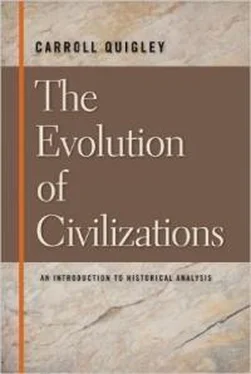The importance of the Minoan-Mycenaean contribution to Greek culture can hardly be overemphasized. From it came many later ideas about the gods and much mythology. Not only did the mythology provide the materials for later Greek art and literature, but Homer, who came from this earlier world, remained the inspiration and model of the Greeks throughout their history. This is of the greatest importance: Homer was not only the earliest figure in Greek literature; he was also the latest figure in an earlier literature. There is nothing primitive, experimental, or unsophisticated in Homer. His poems are not popular folk epics; they are aristocratic heroic sagas. Their chief figures are emancipated, free from social restraints, individualistic, far removed from any tribe or clan with its unexamined social customs or its clinging to the routine of static social life and equally free from any materialistic concerns and from the superstitions and social taboos of economic gain. Their gods are humanistic, and their society is secularized. These are barbarians who have taken over the wealth of the Minoan society and are breaking it up, just as their own tribal units have already broken up. They are enjoying their new, and unearned, wealth, power, and freedom. They have a "joy in life and pride in individual brilliance." They have freed themselves completely from the customs of their barbarian forebears; they have no understanding or sympathy for the customs of the submerged lower classes who support them.
They are completely unconcerned with problems of production, with the origin of the wealth they enjoy, with population pressures. Freed from such concerns, they occupy themselves with self-expression and the pursuit of honor and personal glory. This is an aristocratic outlook that ever after dominated Greek culture.
This outlook was, as we have said, Mycenaean. But beneath it was an older, more elegant yet more irrational tradition, closer to nature and thus both more concrete, more colorful, but at the same time less free and much closer to magic, superstition, and the fertility rites associated with the mysteries of agricultural production. This is the Minoan tradition. From this Minoan tradition comes much that we regard as typically Greek—love of nature, of the sundrenched land and the mysterious sea—but it also provided the rural superstitions, the mystery rites of fertility, the orgies dimly associated with the intoxicants of Bacchus or the behavior excesses of Dionysius. The best of this tradition is found in Homer's literary expressions, figures of speech, and use of images. Artistic representation of these can be found in the art of the Minoan period and in the words of Homer. From the latter it passed on to the Greeks, so that when they, for example, thought of death and resurrection they thought of the poppy drooping with its seeds as the Minoans depicted it or as Homer described it.
Classical culture is a Greek creation—more accurately it is an Ionian creation and became Greek largely because the culture created by the Ionians was generally accepted by the literate and cultivated classes of all Greek-speaking peoples. This can be seen in the general admiration of Homer or Plato. Though this Greek culture was accepted by the Romans, it always remained for them an adopted culture, a garment that was put on and could be cast off without ever becoming an intimate or essential part of the wearer. Thus the history of the culture of the Romans (for example, in religion) is largely the history of how they found and adopted Greek culture. This history began only at a late date, about 200 B.C., when the Romans began to learn Greek; it reached its peak about 50 B.C. in Cicero, because Cicero fell in love with Greek culture and acquired a deep knowledge of Greek thought and the Greek language (without, it might be added, allowing these ever to become his own nature and outlook). Roman cultural history began to decline when Cicero died in a typically Roman way (murdered 43 B.C.), and it moved downward exactly in step with the decrease in Roman knowledge of Greek culture, with their decreasing interest in its message, and, most obviously, with the decrease in knowledge of the Greek language among educated Romans. This decrease in knowledge of Greek by Latin-speaking people marked not only a decline in Roman culture; it also marked the beginnings of the split between the Latin world and the Greek world which later appeared as a split between the Western Roman Empire (which disappeared in the fifth century) and the Eastern Roman, or Byzantine, Empire (which disappeared only in the fifteenth century), as well as the schism of the Christian church into Roman and Orthodox branches (that continues today).
The Ionian culture that was adopted as their own by the Greek-speaking world, and put on like a garment by the Latin-speaking world, was never the culture of the whole Mediterranean basin because it was the culture of the literate upper classes only. These were the slaveowning minority who knew how to read and write, who had leisure, and who used that leisure to read Homer, Plato, Cicero, and Virgil. The great mass of the inhabitants of the Mediterranean world did not share this culture; they were born, worked, had children, and died. This great mass included the rural inhabitants at all times and even the majority of city dwellers at most times. In other words, the Classical culture we so esteem was the culture of a small minority of city dwellers except for a brief period of a century and a half (480330 B.C.) in Athens. In this brief period, it may be that the majority of the inhabitants of that city had some idea of what we call Classical culture. Otherwise, in other cities generally, and in rural areas always, the masses of the people lived in a morass of ignorance and superstition that is difficult for us to imagine. To them life was an irrational chaos of conflicting powers and forces of which the chief were a myriad of local gods and spirits.
This substratum of irrationality and localism beneath the veneer of Classical culture must always be kept in mind if we are to appreciate properly the great achievement of the small minority that possessed this culture and if we are to understand how this culture was destroyed when this minority was crushed and finally submerged by the rising tide of militarism, ruralism, and irrationality.
Classical culture was a class culture and it was an urban culture. This was almost inevitable at a time when there was no general system of education (so that the majority was illiterate) and when all written material had to be copied by hand because of the lack of printing (so that it was too expensive for the majority to possess). Even for the minority most information came through conversation. Classical culture was also isolated from the economic activities of everyday life, because it was an urban culture at a time when the city had no real economic function, but was completely dependent for its economic support on the agricultural activities of the rural areas. The city did not pay for its agricultural imports by industrial exports or by commercial activities as a modern city does, except in a few cases of which the chief, once again, is Athens during the period 480-300 B.C. Otherwise, as a usual thing the city existed as an economic parasite on the country and was able to import food because of its political or legal position rather than because of its economic activities. This is merely another way of saying that Classical culture was a class culture, possessed by a small minority of city residents whose legal and political rights permitted them to make economic demands on the rural population and who were able to build up Classical culture because their legal rights gave them the leisure to do so. The key to this leisure and to their privileged position is to be found in slavery.
Читать дальше










